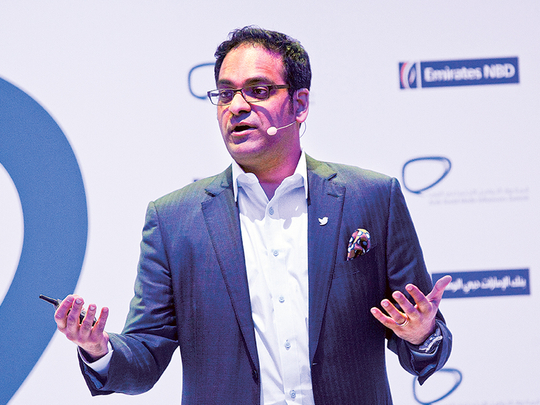
Dubai: Twitter will open its offices in Dubai in the next few months, Shailesh Rao, the Vice-President for Asia Pacific, Latin America & Emerging Markets at Twitter, announced at the Arab Social Media Influencers Summit today, during a session that discussed the future of Twitter.
Once opened, the offices will be the platform’s first office in the Middle East and North Africa region, with the aim of better serving local users, partners and advertisers.
“Mena is a key strategic market for us and our new Dubai office will serve as the focal point to help our development across the region. Dubai is a regional hub for many brands and advertising agencies and we are excited to build a team on the ground here who can work with partners directly, helping them get the most out of Twitter,” said Rao.
The Mena is one of the fastest growing markets for Twitter worldwide and this announcement comes as a part of the company’s increased investment and commitment to the region. “Globally, in 2014, we’ve seen user growth across our markets aligned to key cultural moments. In Mena, for instance, TV was a significant catalyst — we saw a 200 per cent increase in TV conversations between 2013 and 2014,” explained Rao.
Several factors have contributed to Twitter’s growth in the Middle East, most significantly the changing demographics. More than 30 per cent of the Mena population is now between the ages of 15 and 29, representing more than 100 million youth who have grown up with the internet and social media.
Rao said Twitter users in the Mena region comprise 60 per cent male users and 40 per cent female, adding that 80 per cent of the social media platform users depend on its phone application to share their ideas more quickly.
The Gulf region, UAE, and Saudi Arabia in particular, represent some of the largest groups of active internet users of Twitter and will most likely continue to be the driving centres for Twitter’s growing presence, he said.
Recent statistics show that 88 per cent of the Middle East’s online population uses social networking sites daily and Twitter is no exception. In fact, more people, brands and businesses are realising the potential of Twitter to connect them with a global audience; as a result, the platform itself is increasingly becoming an important part of the social culture in the Middle East.
The upcoming Dubai office is the latest in Twitter’s concentrated effort to boost its global offline presence. In the past 12 months, Twitter has opened several offices around the world — the last quarter alone saw the addition of 13 new markets — resulting in a current sales presence in 73 countries worldwide.
“Our vision is to make Twitter relevant for everyone, everywhere. Seventy-seven per cent of our monthly active users are outside the US. Our expansion and decision to set up office in Dubai is a natural step in being closer to our customers and partners, and provides a great opportunity for us to continue our growth,” said Rao.
Columnist Sultan Al Qasimi and Patrick De Laive, co-founder of The Next Web, took to the stage next to discuss the future of Twitter.
“I think that videos are the new trend, and social media platforms like Twitter will introduce auto play, said Da Laive. He said one of the challenges Twitter is currently facing is trying to get back its user engagement, which has declined considerably since 2008, adding that social media platforms need to care about their user numbers.
Al Qasimi, on the other hand, believes that spamming, hacking and abuse are some of the challenges that Twitter is facing.
De Laive disagreed, saying that these problems are present in all social media. For example, he said, Twitter has a lot of fake accounts with users creating accounts to push re-tweets and engagement on their real accounts.












